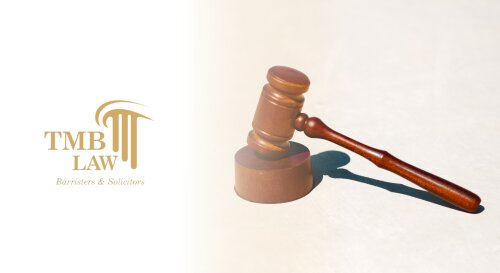Best Father's Rights Lawyers in Oshawa
Share your needs with us, get contacted by law firms.
Free. Takes 2 min.
Free Guide to Hiring a Family Lawyer
List of the best lawyers in Oshawa, Canada
About Father's Rights Law in Oshawa, Canada
Father's Rights Law in Oshawa, Canada, addresses the legal rights and responsibilities of fathers concerning their children. This includes issues of custody, access, child support, and paternity. Canadian family law aims to ensure that both parents have the opportunity to be involved in their children's lives, provided it is in the best interests of the child. Oshawa follows these principles and has specific guidelines and resources to support fathers seeking to assert their rights.
Why You May Need a Lawyer
There are various situations where a father in Oshawa may require legal assistance to navigate the complexities of family law:
- Disputes over child custody and access: Resolving disagreements on who will be the primary caregiver and how parenting time will be divided can be challenging.
- Child support issues: Ensuring fair financial support for the children, whether you are paying or receiving child support, often requires legal guidance.
- Paternity claims: Establishing paternity is crucial for a father to assert his rights or fulfill his responsibilities.
- Modification of existing agreements: Changes in circumstances may necessitate modifications to custody, access, or child support arrangements.
- Protection from false accusations: Fathers may need legal representation to defend against untrue allegations that could affect custody or access.
Local Laws Overview
The key aspects of local laws relevant to Father's Rights in Oshawa, Canada include:
- Custody and Access: The best interests of the child standard is applied to determine custody and access arrangements. Both parents are encouraged to be involved in the child's upbringing.
- Child Support: Child support is calculated based on federal and provincial guidelines, considering the income of both parents and the child's needs.
- Paternity: Legal recognition of paternity can be established through a declaration or DNA testing, if necessary.
- Parental Agreements: Parents are encouraged to create parenting plans that outline custody, access, and support details. These plans can be made legally binding with the court's approval.
- Family Responsibility Office (FRO): The FRO enforces child and spousal support orders, ensuring compliance.
Frequently Asked Questions
What is the "best interests of the child" standard?
The "best interests of the child" is a legal standard used to determine custody and access arrangements, focusing on the child's physical, emotional, and psychological well-being.
Can I get joint custody of my child?
Yes, joint custody is possible if it is in the child's best interests. Courts prefer arrangements where both parents are actively involved in the child's life.
How is child support calculated?
Child support is calculated based on the Federal Child Support Guidelines, considering the income of both parents and the number of children involved.
What if my ex-partner denies me access to my child?
If your ex-partner denies you access, you can seek enforcement through the court. A lawyer can help you file the necessary legal documents.
Can I modify an existing child support order?
Yes, you can request a modification if there has been a significant change in circumstances, such as income changes or the needs of the child.
How do I establish paternity?
Paternity can be established through mutual agreement, by being named on the birth certificate, or through DNA testing if there is a dispute.
What is a parenting plan?
A parenting plan is a written agreement between parents outlining custody, access, and other parenting arrangements. It can be made legally binding if approved by the court.
What should I do if I face false accusations in a custody battle?
Seek legal representation immediately. A lawyer can help gather evidence, represent you in court, and protect your rights.
Can I move to another city with my child?
Relocating with your child may require permission from the other parent or a court order, especially if it affects the existing custody or access arrangements.
What resources are available to help me understand my rights?
There are various resources, including government websites, legal aid clinics, and father's rights organizations, that provide information and support.
Additional Resources
Here are some resources that can be helpful for someone seeking advice on Father's Rights:
- Law Society of Ontario: Offers a directory of licensed lawyers in your area.
- Legal Aid Ontario: Provides legal assistance for those who qualify financially.
- Family Responsibility Office (FRO): Enforces child and spousal support orders.
- Ontario Ministry of the Attorney General: Provides information and resources on family law.
- Local Father’s Rights Groups: Organizations that offer support and resources specifically for fathers.
Next Steps
If you need legal assistance in Father's Rights, consider the following steps:
- Consult with a Lawyer: Look for a family lawyer experienced in Father's Rights in Oshawa.
- Gather Documentation: Collect all relevant documents, including communication logs, financial records, and any existing agreements or court orders.
- Know Your Rights: Educate yourself about your rights and responsibilities under local family law.
- Consider Mediation: Mediation can be a collaborative way to resolve disputes without going to court.
- Stay Involved: Remain actively involved in your child's life, maintaining regular communication and participation in their activities.
Lawzana helps you find the best lawyers and law firms in Oshawa through a curated and pre-screened list of qualified legal professionals. Our platform offers rankings and detailed profiles of attorneys and law firms, allowing you to compare based on practice areas, including Father's Rights, experience, and client feedback.
Each profile includes a description of the firm's areas of practice, client reviews, team members and partners, year of establishment, spoken languages, office locations, contact information, social media presence, and any published articles or resources. Most firms on our platform speak English and are experienced in both local and international legal matters.
Get a quote from top-rated law firms in Oshawa, Canada — quickly, securely, and without unnecessary hassle.
Disclaimer:
The information provided on this page is for general informational purposes only and does not constitute legal advice. While we strive to ensure the accuracy and relevance of the content, legal information may change over time, and interpretations of the law can vary. You should always consult with a qualified legal professional for advice specific to your situation.
We disclaim all liability for actions taken or not taken based on the content of this page. If you believe any information is incorrect or outdated, please contact us, and we will review and update it where appropriate.












